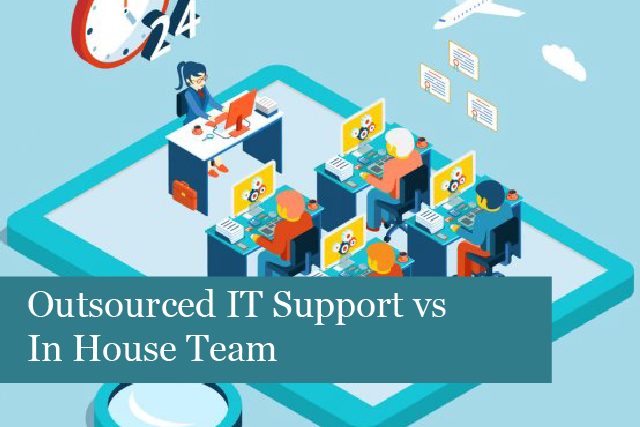
Is it better to outsource IT support or have an in-house team for your IT needs? The answer is it depends. For instance, a small company may find outsourcing the best option. However, a larger company may find having an in-house IT team is the right solution.
IT services can be expensive, especially for startups and small businesses. In these companies, IT management may fall to the “techiest” person in the office. They may have to manage the company server, all desktop, and mobile devices, and more. However, this isn’t really the best solution in the long run. As a business grows, it’s IT needs will also grow, making the “techy” person’s job that much more difficult. What’s more, this person will find it harder to do their real job, which leads to frustration, overwork, and more.
These are a few of the reasons that smaller businesses choose to outsource their IT support. It’s usually cheaper, and they’ll have a trained tech who knows what they’re doing. This is a more effective solution rather than relying on the “techiest” person in the office!
What about larger businesses? What are their IT struggles? For one thing, an organisation’s established IT team may find it more challenging to focus on the larger IT strategy the company requires. This can happen when the IT team must focus on routine activities, such as fixing broken devices or even managing IT threats.
What are the advantages and disadvantages of outsourcing IT support over an in-house team? Which is the best solution for your company? In this article, we’ll take a look at the advantages & disadvantages of in-house IT support and outsourcing IT support.
Advantages of In-House It Support
No matter how a company chooses to take care of its IT support, some advantages and disadvantages must be faced. In this section, we’ll take a look at the advantages of in-house IT support.
- It’s possible to build a team that has highly specialised knowledge of your system and network, as well as the company’s overall business objectives.
- An in-house IT support team is available to answer questions and take care of issues as they arise. Some larger companies may even hire a night team of IT techs to work the off-hours, which means there’s always someone keeping an eye on the network. They can quickly resolve systems failures and other problems.
- An in-house IT support team also means it’s easy to predict salary costs. This usually remains static (most of the time), which means IT techs get paid a set amount for the tasks they perform.
Disadvantages of In-House IT Support
Here are some of the most common disadvantages of in-house IT support.
- Unpredictable costs can be one of the disadvantages of an in-house IT support team. The costs of recruiting, training, providing support and equipment to the team are expensive. There’s no way around that.
- One of the largest expenses for an in-house IT support team will be the salaries. However, don’t forget it’s also necessary to pay employers NI, pension contributions, annual bonuses, and more.
- For small businesses, an in-house IT team can be a huge disadvantage when they only have a small team. In some businesses, this may mean their team is comprised of only one or two employees. What happens if they both get sick, are away over the holidays, and more? This can lead to huge disruptions of service, lost uptime, and much more.
- Smaller IT teams may also suffer from knowledge gaps, which means the team may not be able to stay current with the latest tech or even the current threats. This can make a small business very vulnerable to cyberattacks.
- Lack of innovation can be another problem. When the team doesn’t have strong leadership, then it’s more challenging to create processes and systems to help the business run more efficiently.
Advantages of Outsourced IT Support
In this section and the next, we’ll take a look at the advantages and disadvantages of outsourced IT services. First, let’s take a look at the advantages.
- Outsourcing IT support can be a more cost-effective solution. The reason for this is that internal IT teams need at least two full-time employees, which can be very costly for a small business. By outsourcing IT services, there’s no need to pay salaries or the other required employer contributions.
- Outsourcing makes it easier to have access to a broader range of knowledge and expertise. IT support firms generally employ several qualified professionals who provide different specialties.
- Outsourcing can be a great solution for smaller companies, as they won’t have to worry about their one or two IT employees being out sick, on vacation, and more.
- Outsourcing also allows your techy employees to focus on their main job rather than dealing with IT issues and their main job at the same time. For larger companies, there’s also the benefit of their IT department to focus on larger strategies rather than taking care of day-to-day issues.
- A reliable IT service supplier will provide you with a Service Level Agreement (SLA), which clearly states the expected services and imposes penalties when those services are defective.
- An IT services provider will also provide proactive monitoring and reporting on your network. This means they can spot problems as they arise and fix them quickly. Downtime is kept to a minimum, and your company is able to run efficiently.
Disadvantages of Outsourced IT Services
Now, we’re ready to review the disadvantages of outsourcing IT services.
- Some companies may find it challenging to let another company manage and control their network. However, this is all the more reason to be especially careful to choose the right IT service provider.
- Security and confidentiality may also be a concern for some businesses. Outsourcing may be challenging if the company has sensitive data, is in a regulated industry (such as the financial sector), and more. Outsourcing IT services could even lead to legal and administrative costs.
- Some businesses may also be worried about the lack of communication between an in-house team and an external IT support team. This can be a problem at times, so it may be necessary for these companies to go with an in-house IT support team rather than outsourcing their IT services.
Summing It Up
The choice of whether to use an in-house IT team or outsource IT services is a huge challenge. But ultimately, it comes down to what’s best for your company and the type of projects you work on.
If you’re a company that needs an innovative team with specialised knowledge, then outsourcing may be the best option! You can still maintain control and implement communication standards to ensure everything goes smoothly with your in-house and outsourced teams.
Recommended Posts

10 Biggest Cybersecurity Mistakes of Small Companies
18th April 2025

The Importance of Planning in Business IT Solutions
11th April 2025

